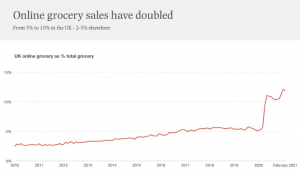The Express Grocery Delivery Boom in the UK is Changing the Fast Delivery Scene in the Country

For the last three months, there is an under-10-minutes grocery delivery craze going on in the UK. Newcomers and start-ups like Getir, Weezy, Zapp, and Dija have made a great impact in the scene of grocery delivery in a very short time, and they have a reason to do so: it’s really fast!
Express grocery delivery is not a new term for Londoners; services like UberEats and Deliveroo had opened the gate of the new age of grocery shopping last year, and at first, it seemed fast with under one-hour estimated times of arrival, but as everything else on the planet, the model has given birth to its own, more assertive rivals.

According to the Office for National Statistics, after the launch of ultra-fast grocery delivery services, online grocery sales have doubled in the UK, in just under three months! Considering that the services are not available in the whole country, the impact is incredibly exciting.
Three Reasons Behind The Huge Impact
Three months is a very short time for such an impact, even for the age of speed that we’re in. Express grocery deliverers are playing their best game to take the biggest bite from the cake, and there are three main reasons behind this huge success.
Building credibility with the right inventory
Until the emergence of ultra-fast grocers, we had seen similar models, but with one huge exception: real-time stock tracking. Grocery deliverers before players like Getir and Weezy mainly relied on their partner supermarkets, which made their hands short on inventory tracking, making them unable to deliver the whole shopping baskets or with substitutions. Although the model seemed like working, unpleasant surprises created a negative impression with customers. Since rapid grocers mainly rely on their own stores or warehouses, they manage to offer what’s available at all times, eliminating even the smallest undesirable occurrences. Dijia’s CEO and co-founder Alberto Menolascina shares their strategy on the matter with the following: “A customer can order something on Dija and know it will arrive thanks to our tech platform, whereas they might order something on another app to be picked up from a local store and not actually know whether that key item will be delivered. Customers don’t want substitutions or missing items, and we’re ensuring this is a core part of our promise.”
On-point promotions
There are at least five express grocery delivery services in London at the time we are writing this article, and all of them launched at the same quarter—it’s an exciting competition! Expectedly, the competitive scene puts the services in a place where they need to offer crazy deals to their customers to build loyalty. Customers can make their first orders from each of these apps for nearly free of charge! Of course, the first discount coupons and promotions are not all that these services have to offer. Thanks to AI, they can know their customers and give them on-point promotions in the future, considering each of their warehouse inventories to reach the maximum profit. In the end, the services become win-wins for everyone.
Faster and safer than a trip to the store
The selling point of all of the rapid delivery services are, of course, their incredible speed and convenience. Keeping the promise of under-10-minute delivery is the first thing that lures potential customers. Plus, it really takes shorter than tying your shoelaces and taking a trip to the store with your mask on. Yes, it’s a challenging operation to build in the first place, but growing steadily is the key.
Next stop is Europe, and anybody can join
London seems like the safest testing zone for the rapid grocery delivery services for now, but we are already seeing European players to offer faster delivery options. Wolt, a food and grocery delivery service in Finland announced its plans to get into the ultra-fast game with $530 million, and it’s not alone.
Founder of Getir, Nazım Salur, states that London is the first step of their international operation. The company has been active in its homeland Turkey for more than five years, changing the whole retail and grocery scene in the country, and the investments show us that big European cities are the next chapter for the revolutionary delivery service.
Join the New-Age Grocery Revolution within Months!
Although it seems extremely challenging to build a service that offers super-fast delivery, there are many ways to go. You can read our blog post about creative ways to build an express delivery service here.
On the software front, the most reasonable path for beginners looks like outsourcing technology from an experienced team, and we are here to help. Here at Tmob, we have been building omnichannel online platforms for grocers for years, and since the industry is leaning towards express delivery, we have designed a brand new platform that meets the demands on the quickest way of grocery delivery. With Tmob Express eCommerce Platform, you can launch your express delivery service within months. Our AI-based platform has all the capabilities that’s expected from a 2020s delivery service, and the best part is, it’s customizable for any kind of business needs. See what we offer by visiting our Express eCommerce Platform page or fill out the form to meet a Tmob expert.
Sources: 1 Benedict Evans on Twitter: "UK ecommerce revenue has now reached 50% of total 2019 retail spending (excluding supermarkets) https://t.co/kZLAtkqQLr" / Twitter 2 Getir, Weezy and Zapp: the rapid delivery players leaving Deliveroo in the dust | Analysis & Features | The Grocer 3 Europe’s Grocery Delivery Firms Awash With Cash And 15-Minute Promises (forbes.com)




